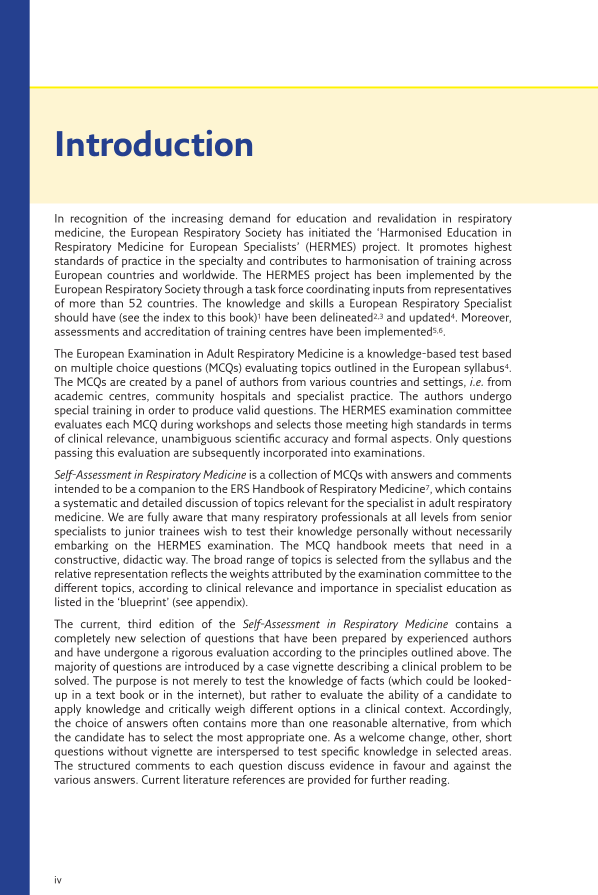Introduction iv In recognition of the increasing demand for education and revalidation in respiratory medicine, the European Respiratory Society has initiated the ‘Harmonised Education in Respiratory Medicine for European Specialists’ (HERMES) project. It promotes highest standards of practice in the specialty and contributes to harmonisation of training across European countries and worldwide. The HERMES project has been implemented by the European Respiratory Society through a task force coordinating inputs from representatives of more than 52 countries. The knowledge and skills a European Respiratory Specialist should have (see the index to this book)1 have been delineated2,3 and updated4. Moreover, assessments and accreditation of training centres have been implemented5,6. The European Examination in Adult Respiratory Medicine is a knowledge-based test based on multiple choice questions (MCQs) evaluating topics outlined in the European syllabus4. The MCQs are created by a panel of authors from various countries and settings, i.e. from academic centres, community hospitals and specialist practice. The authors undergo special training in order to produce valid questions. The HERMES examination committee evaluates each MCQ during workshops and selects those meeting high standards in terms of clinical relevance, unambiguous scientific accuracy and formal aspects. Only questions passing this evaluation are subsequently incorporated into examinations. Self-Assessment in Respiratory Medicine is a collection of MCQs with answers and comments intended to be a companion to the ERS Handbook of Respiratory Medicine7, which contains a systematic and detailed discussion of topics relevant for the specialist in adult respiratory medicine. We are fully aware that many respiratory professionals at all levels from senior specialists to junior trainees wish to test their knowledge personally without necessarily embarking on the HERMES examination. The MCQ handbook meets that need in a constructive, didactic way. The broad range of topics is selected from the syllabus and the relative representation reflects the weights attributed by the examination committee to the different topics, according to clinical relevance and importance in specialist education as listed in the ‘blueprint’ (see appendix). The current, third edition of the Self-Assessment in Respiratory Medicine contains a completely new selection of questions that have been prepared by experienced authors and have undergone a rigorous evaluation according to the principles outlined above. The majority of questions are introduced by a case vignette describing a clinical problem to be solved. The purpose is not merely to test the knowledge of facts (which could be looked- up in a text book or in the internet), but rather to evaluate the ability of a candidate to apply knowledge and critically weigh different options in a clinical context. Accordingly, the choice of answers often contains more than one reasonable alternative, from which the candidate has to select the most appropriate one. As a welcome change, other, short questions without vignette are interspersed to test specific knowledge in selected areas. The structured comments to each question discuss evidence in favour and against the various answers. Current literature references are provided for further reading.
